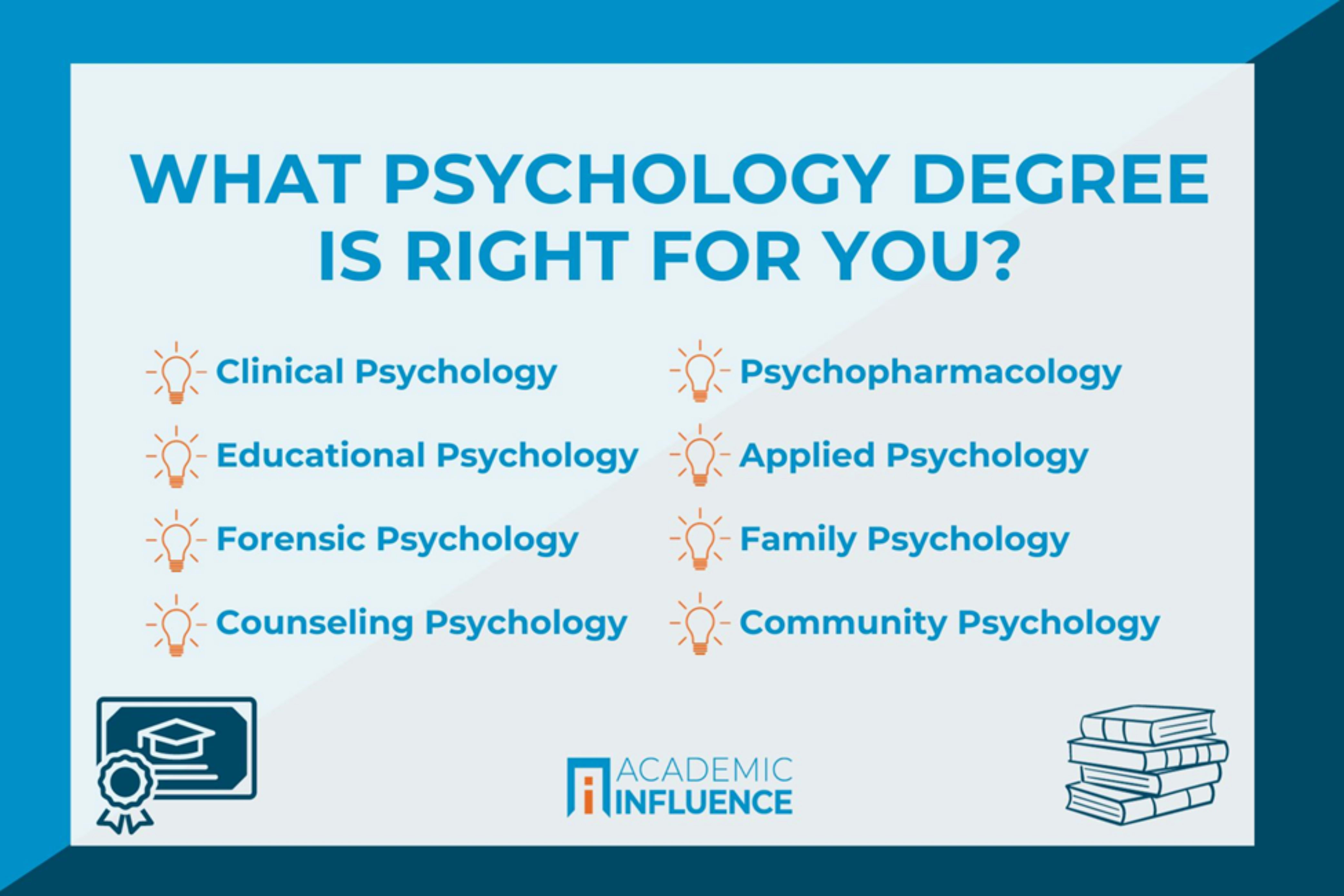Which Psychology Degree is Right for Me?

Key Takeaways
- It is important that the college you choose for your psychology degree is accredited by the American Psychological Association (APA).
- There is a growing demand for clinical psychologists, educational psychologists, and mental health professionals.
- There are a wide range of specialty fields for psychology graduates, further enhancing their career opportunities.
With over 30 psychology degrees preparing graduates for vastly different careers, prospective students often feel overwhelmed analyzing nuanced program options and determining which credentials align with their interests and aspirations.
Navigating differences between BA, BS, Master’s, and Ph.D. routes presents further challenges for learners who are unclear how each degree builds required workplace competencies. So, which psychology degree is right for you?
Understanding Different Psychology Degrees
Beginning with a bachelor’s degree, aspiring psychologists dive into foundational aspects of human behavior, gaining insight into mental health, scientific methods, and human behavior. This foundational stage, often requiring nine to 30 courses, serves as a gateway to broader career opportunities.

A master’s degree in psychology further refines one’s expertise, with a focus on specialized areas such as counseling, clinical, or organizational psychology. Requiring six to 10 courses, this degree opens doors to clinical practice and specific psychology careers. On the doctoral front, candidates explore advanced theories, conduct independent research, and contribute significantly to the field.
With four to 15 courses, a doctorate propels psychologists into leadership roles, fostering groundbreaking research and shaping the discipline. Careers vary across these degrees, spanning clinical psychologists in mental health services, educational psychologists in school settings, and organizational psychologists in corporate environments.
Back to TopExploring Fields of Psychology
Clinical psychologists, often found at the forefront of mental health services, employ scientific methods to diagnose and treat a spectrum of mental health conditions. Educational psychologists, on the other hand, focus on the intricate interplay between learning environments and human behavior, shaping the landscape of education.

In forensic psychology, experts apply psychological principles to legal matters, exemplifying the dynamic intersections between human behavior and the law. Organizational psychologists navigate the complexities of workplace dynamics, enhancing organizational effectiveness. Meanwhile, counseling psychologists play a pivotal role in guiding individuals towards improved mental well-being.
Real-world examples abound, from clinical neuropsychologists addressing traumatic brain injuries to developmental psychologists shaping interventions for children with developmental disabilities. This kaleidoscope of psychology careers, each with its own unique focus and methodologies, provides an enriching journey for those exploring the vast terrain of the human mind.
Back to TopPersonal Aptitude and Career Goals
Starting a psychology path requires carefully considering one’s aptitude and career objectives. A crucial starting point involves a self-assessment guide, where you can identify your intrinsic interests and skills pivotal to excelling in the field.
Aspiring psychologists must dive into the nuances of human behavior, and because of this, personal aptitude plays a very important role. This introspective process helps individuals gauge their inclination towards specific areas, such as counseling psychology or forensic psychology.
Additionally, aligning career goals with the right psychology degree is really important. From pursuing a master’s degree to exploring various psychology career opportunities, individuals can tailor their educational journey.
Back to TopEducational Pathways in Psychology
At the undergraduate level, students typically pursue a bachelor’s degree, with a focus on foundational courses in human behavior and scientific methods. As one progresses, master’s degrees provide an opportunity for specialization, including tracks like counseling psychology or clinical psychology, offering in-depth insights into mental health services.
For those seeking the pinnacle of expertise, doctoral programs await, encompassing clinical psychology and other specializations such as forensic psychology or rehabilitation psychology. Along this academic trajectory, individuals specialize in the depths of psychological theories, honing research methods crucial for independent research.
The educational odyssey doesn’t merely culminate in degrees; it unfolds as a lifelong pursuit, shaping careers in various sectors, from clinical to educational psychology. It is of the utmost importance to get a degree from an American Psychological Association (APA)-accredited institution if the intention of your career is to work as a clinical, counseling, or school psychologist.
When it comes to education, one question we hear undergrads ask is if a psychology bachelor’s degree is enough for entry-level careers, or if a postgraduate education is vital for job prospects in today’s world.
James Barham, PhD, the Vice President and Academic Editor at Academic Influence, responds to that with,
“While a bachelor’s degree in psychology imparts helpful core competencies, the proliferation of advanced credentials has made postgraduate education practically vital for most career paths now. Given the competitiveness of fields like counseling, social work, and market research, even entry-level jobs now expect or prefer candidates to hold master’s degrees, specialist certifications, or extensive internship experiences signaling readiness to add value from day one. That said, broadly-trained BA and BS psychology grads can still leverage their sharpened social skills and data literacy for supporting roles in human resources, recruiting, marketing, and sales.”
Bottom Line: Although a bachelor’s degree can serve as the basis of a psychology career, an advanced degree, including a master’s doctorate degree can open more career opportunities. We take an in-depth look at the field of psychology in our Psychology Major Guide, which contains degree and career information.

Back to Top
Real-World Applications of Psychology Degrees
A psychology degree opens various career paths, each uniquely contributing to our understanding of human behavior. Clinical psychologists, for instance, engage in mental health services, offering vital support. Meanwhile, forensic psychologists navigate the intersection of law and psychology.
From educational psychologists shaping learning environments to rehabilitation psychologists aiding those with developmental disabilities, the impact is far-reaching. This diverse field, enriched by scientific methods and research, encompasses government agencies, research centers, and independent research pursuits. Psychology graduates truly unlock a world of possibilities.
Back to TopNavigating the Job Market with a Psychology Degree
Navigating the job market with a psychology degree offers exciting opportunities in diverse fields. Current trends showcase a growing demand for clinical psychologists, educational psychologists, and mental health professionals.
As mental health services gain prominence, psychology careers present compelling options. Consider specialized paths like forensic psychology or organizational psychology to leverage your psychology degree for career advancement.
Pursuing a master’s degree enhances expertise and broadens career opportunities. Government agencies actively seek qualified psychologists, expanding the psychology job landscape. Stay abreast of psychological theories and research methods to excel in this dynamic field. With versatile applications, a psychology degree equips you to address mental health conditions and contribute meaningfully to the evolving landscape of human behavior.
Back to TopFurther Education and Licensing Requirements
Diverse professions, such as clinical psychologists, educational psychologists, and forensic psychologists, each have unique licensing requirements. These stringent criteria ensure practitioners meet established standards, guaranteeing the highest quality of mental health services. Beyond initial licensure by your state body, continuous education proves paramount in the dynamic field of psychology.
Mental health conditions evolve, and psychologists must stay abreast of contemporary scientific methods and psychological theories. Whether one specializes in cognitive psychology or environmental psychology, ongoing professional development is integral.
Licensing Requirements:
Although each psychology niche might have further and more specific requirements, every specialist should have the following:
- Doctorate in psychology
- Compile supervised work hours. Practitioners must perform their job in a supervised environment for from 1,500 to 6,000 hours, depending on the state, before being able to perform the service alone
- Obtain a passing score on the Psychology Professional Practice Exam (EPPP), if applicable
- Pass a jurisprudence exam
Then, if all the requirements have been fulfilled, you can obtain a license from a state licensing authority.
There are several psych degree options, from clinical psychologists addressing mental health conditions to educational psychologists shaping the future of learning. Prospective students embarking on this academic pursuit are urged to align their psychology degree with their passions, ensuring a fulfilling career that resonates with their unique aspirations.
If you think a psychology degree is right for you, but you want it as quickly as possible, check out the fastest accelerated online bachelor’s degree programs in psychology.
If you already have a psychology degree, but want to further your education while still maintaining your work and life commitments, there are also accelerated online doctorate programs in psychology from top-ranking colleges and universities.